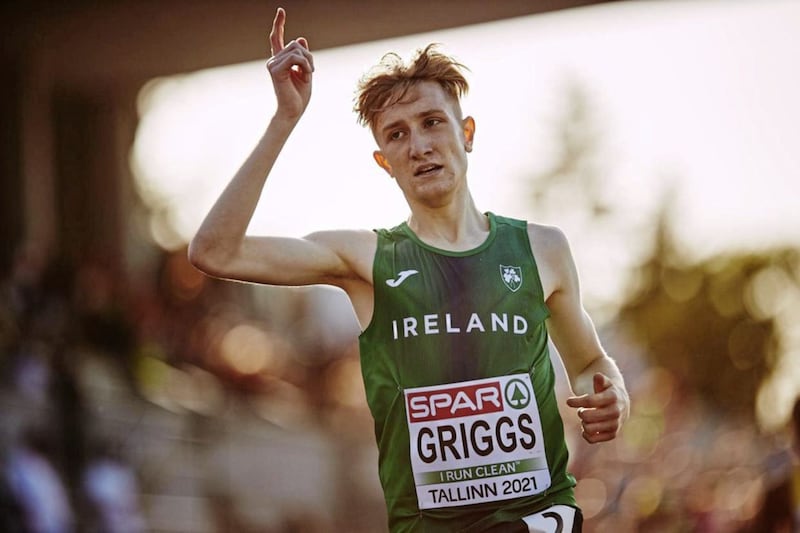The achievements of Ciara Mageean and Rhasidat Adeleke on the international stage have reached a truly remarkable level by any standards.
Both are young Irish women of rare qualities, who have demonstrated through their gold medal performances at the European Athletic Championships in Rome that they will be serious contenders when the Paris Olympics get under way at the end of next month.
Although they are from different backgrounds, the common factor is that they are comfortable with their identity and equally determined to represent their country with distinction.
Mageean is already well known to readers of this paper, and, although she would deserve exactly the same respect if she was a Portavogie hockey player, the fact that she is a Portaferry camóg means that she has needed to maintain particular strength of character.
While there are many parts of Ireland, north and south, where an involvement with Gaelic games is a wider social and often a professional asset, Portaferry would not usually be regarded as one of them.
Tucked away at the tip of the overwhelmingly unionist Ards peninsula, the village is isolated from most of the rest of the GAA world, with only the rivalry with the neighbouring and equally small clubs of Ballycran and Ballygalget to sustain it.
The nearest large towns, Newtownards and Bangor, with a combined population of almost 100,000, have no GAA presence, and even getting to Mageean’s school, Assumption Grammar in Ballynahinch, meant a daily ferry crossing followed by a round trip of an hour by bus.
Switching from camogie to athletics was not an easy call, as relatively few Irish women from the north or the south have made it to the first rank of track and field disciplines over recent times.
Ciara Mageean’s declaration - “I didn’t grow up playing camogie to get boxed in” - passed immediately into the list of great Irish sporting quotations and epitomised why she is held in such huge affection
It is more than two decades since Sonia O’Sullivan was at the peak of her outstanding career, winning world and European titles, while the supreme accolade of an Olympic gold medal was secured by Mary Peters over half a century ago.
Mageean, at 32, has followed them with an easy grace, and her confidence was on full display as she explained to television viewers how she coped when two Team GB competitors almost blocked the path to her 1500m European triumph with the finishing line in sight.
Adeleke, who at 21 is at an even earlier stage in her development than Mageean, played a key role in the 4 x 400m mixed relay team which thrillingly won gold in Rome, and then went on to take silver in both the individual section and the women’s relay over the same distance.
She was the first Irish woman to break the 50-second barrier in the 400m and already holds six national records, so the relentless nature of her progress means that she is also being tipped as a genuine medal possibility at the Olympics.

Adeleke was born in Tallaght to Nigerian parents, and her accent and terminology confirmed during her many post-race interviews that she is unmistakeably a daughter of Dublin, who makes sure that she regularly travels home from the University of Texas for competitions both in Ireland and abroad.
She summed up her philosophy when she told The Irish News in April: “Even in an individual race I am running for more than myself, I’m running for my family, my friends, my coaches, my country and all the people who have supported me.”
Adeleke’s coach Edrick Floreal said at the weekend that she was “in a dark place” after reading racist posts about her on social media, and offered his encouragement to the athlete.
There have been observers, both online and elsewhere, who somehow regard Mageean and Adeleke as in separate ways outsiders, and question why they are involved in Irish squads.
Not everyone on the Ards peninsula was thrilled that Mageean draped the Tricolour around her shoulders after her victory in Rome, and beamed with such obvious delight when the Irish national anthem echoed around the stadium as she was presented with her medal the following day.
Nor is everyone in Dublin enamoured with the growth of a vibrant multi-racial culture in the city, or wants to see gifted young athletes from a variety of ethnic groups, including Adeleke, wear the Irish vest as they stand on the victory podium.
However, Mageean and Adeleke are true to their own beliefs and can rely not just on talent but also on integrity as they progress in their chosen fields.
They have made their decisions and will be unperturbed and perhaps even more motivated if others wrongly suggest that they should be running under different flags during international events.
We can all be equally proud of Mageean and Adeleke, regardless of our individual political views, and hope that Olympic glory comes their way later in the summer.
They are the kind of individuals who, if we are fortunate, come along once in a generation. In many ways they are helping to define their generation and are the face of modern Ireland.









